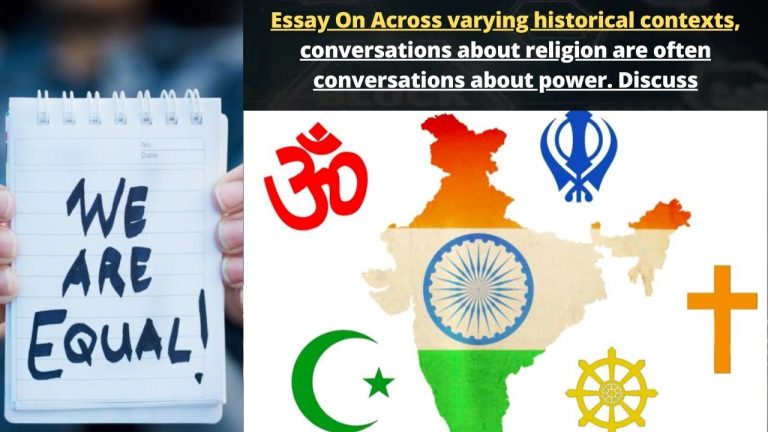"Advertisement"
Essay On Across varying historical contexts, conversations about religion are often conversations about power. Discuss
Introduction
Throughout history, religion and power have been interwoven, molding civilizations and affecting people. This essay examines how religion and power interact in diverse ways across a range of historical circumstances.
It explores historical instances to show how religion has been a weapon for the consolidation and exercise of power.
We can acquire insight into the broader consequences for modern society by comprehending the historical interactions between religion and power.
Religion as a Source of Power
Religion has frequently played a significant role in society, offering a framework for ethical decision-making, social cohesiveness, and governmental legitimacy.
Religious organizations have made claims of having divine authority in order to increase their dominance in various historical circumstances.
The ancient world, where kings were frequently viewed as deities or divine representations, is an example of how religion and power are intertwined.
Ancient Egyptian pharaohs and Chinese emperors also acquired their power from religious convictions, which helped them increase their control over the populace.
Controlling the Masses
Religious organizations have always had a big hand in dictating the public’s beliefs and behavior. In order to impose control over people’s lives, monarchs and religious leaders have used the strength of religious concepts and beliefs.
A good illustration of the use of religion as a weapon of authority is the Middle Ages in Europe. With its monopoly on spiritual concerns, the Catholic Church had tremendous power over the general public.
By using techniques like the Inquisition and the enforcement of religious rules, this control effectively subjugated people and suppressed dissent.
Justifying Hierarchies
Power structures and social hierarchies have also been reinforced through the use of religion.
Religious concepts have often been used historically to explain inequality between various social groupings. An extreme example of this is slavery in the Americas.
African peoples’ enslavement by European colonisers was justified by religious justifications that they were heathens in need of salvation.
Such myths strengthened racial and economic hierarchies, allowing the powerful to maintain their supremacy while taking advantage of the weaker members of society.
Religious Conflict and Power Struggles
Religious disagreements have fueled wars and power struggles throughout history. For instance, the desire to recapture sacred places and increase religious power led to the Middle Ages’ Crusades.
Religious zeal turned into a rallying cry for political and military goals, revealing how power dynamics and religious disputes may be interwoven.
Conclusion
Debates about religion are in fact debates about power, regardless of the historical setting. Religion has been a source of authority, allowing authorities to reign over and sway the populace.
It has been employed to maintain disparities, legitimise social hierarchies, and spark conflict.
Understanding historical events and their repercussions for modern society requires an understanding of the intricate interplay between religion and power.
We may work to establish a future where religion serves as a source of harmony, tolerance, and respect rather as a tool for dominance and control by recognizing historical trends.
Finally, Thanks For Reading “Essay On Across varying historical contexts, conversations about religion are often conversations about power. Discuss“.
If you have any questions related to “Essay On Across varying historical contexts, conversations about religion are often conversations about power. Discuss“, So, please comment below.
Must Read:
Essay On the Growing Culture of Junk Food
Essay On the Role of drone technology in Agriculture
